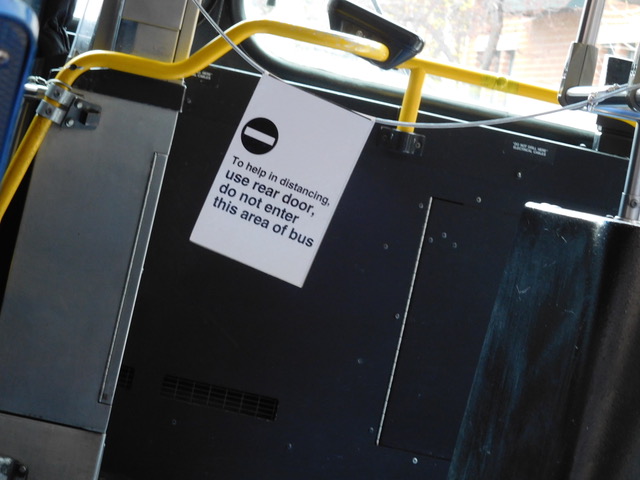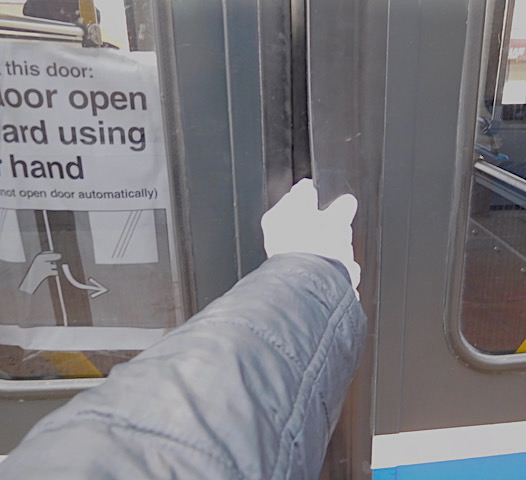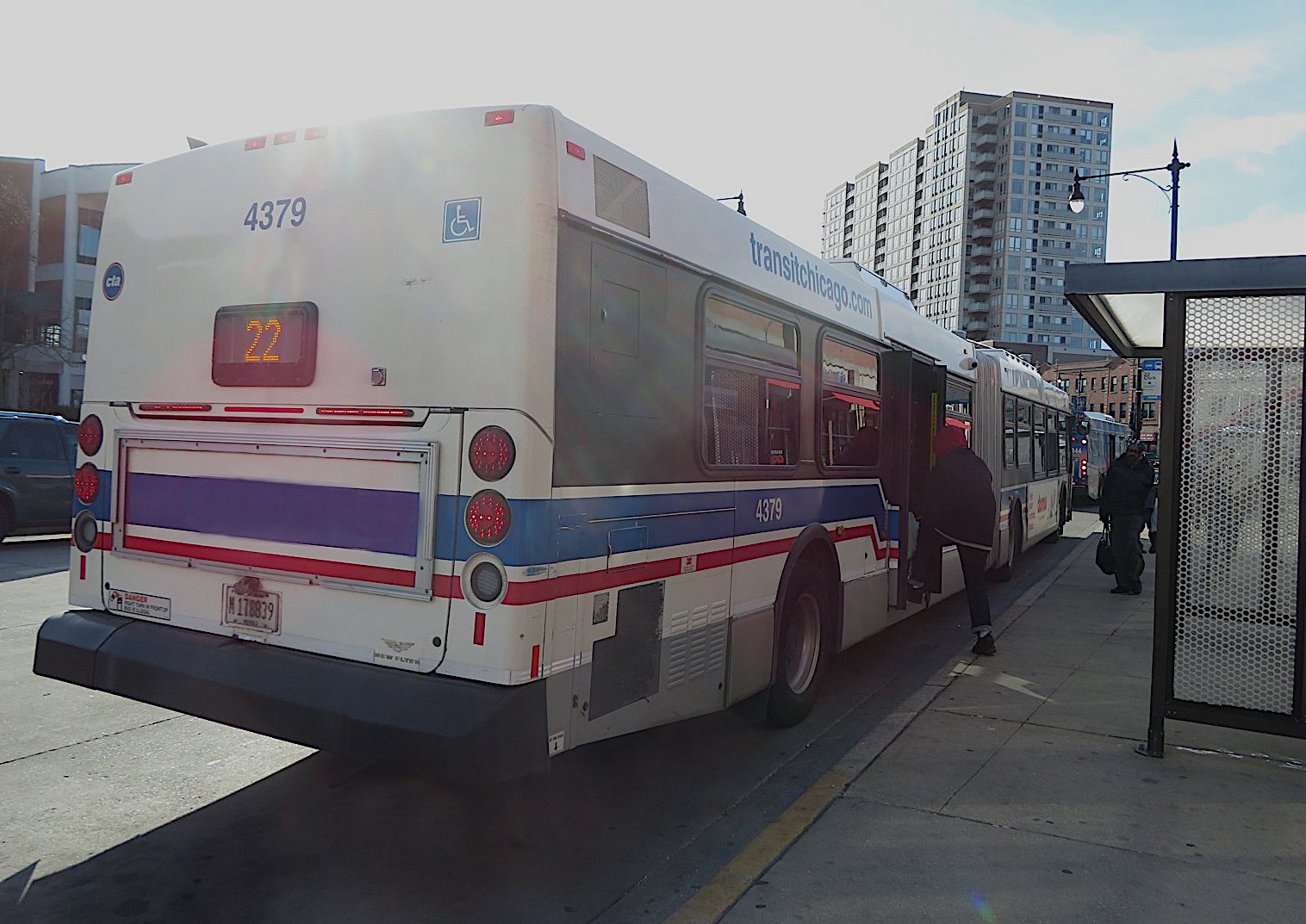Ever since the Active Transportation Alliance put out its 2017 "Back on the Bus" report, the group has been advocating for all-door bus boarding as a strategy to speed up service. During the COVID-19 pandemic, many other U.S. cities began waiving bus fares to enable passengers to board buses from the rear door, to reduce drivers' potential for viral exposure and prevent queuing. Streetsblog Chicago pushed for the CTA to follow suit to protect workers and customers.
On April 9 the CTA finally debuted rear-door boarding, but with a twist. In February the agency had announced plans to pilot all-door boarding on the #J14 Jeffrey Jump and #192 University of Chicago Hospitals Express bus routes, starting in June, with Ventra fare card readers installed inside the rear door. So while bus service on all lines is currently free, the CTA is in the process of installing rear-door card readers on all buses, so within a few weeks customers will be required to pay again.

As another safety strategy during the crisis, the CTA is allowing drivers to run buses express with drop-off service only on a regular 40-foot bus has 15 passengers, or a 60-foot accordion bus has 22 riders. This will prevent unsafe crowding and allow for social distancing. If a bus is running express, an additional vehicle will be dispatched to the line to pick up the slack.
To learn more about the bus user experience during the pandemic, I boarded the #151 Sheridan, #152 Addison and #156 LaSalle bus lines which were running the 60-foot articulated buses. Additionally, I boarded the #22 Clark, #36 Broadway, #77 Belmont, and #80 Irving Park buses that were running the 40-foot style buses. (Note that Illinois' Stay at Home order prohibits using transit during the pandemic except for work-related trips, which mine were, and other essential commutes.) None of these buses had a fare card reader at the rear of the bus. As a result, all patrons boarded without having to pay.
During my time on these buses, they all had ten or fewer customers. Many of the riders were wearing face masks, as recommended for time spent in public by the Centers for Disease Control and Prevention and Governor J.B. Pritzker. I conducted socially-distanced interviews with a few fellow passengers.
A #22 rider named Maria said she's enjoying riding for free and has been using buses instead of the 'L' (where you still have to pay) whenever possible to save money. However, she indicated that she would be angry if she was waiting at a bus stop and a bus with 15 or 22 riders running express passed her by, and she had to wait for another one.
During my Clark Street trip, an issue arose when a gentleman boarded at Barry Avenue with a big suitcase, a large backpack, and a hand cart. Rather than following the six-foot social distancing rule, the individual sat down right next to another passenger. He also left his cart near the rear door, which blocked the entrance and exit for other patrons. A female passenger started to tell him that he needed to move his belongings. He yelled a few expletives at her and left the items near the door.
At the next stop, a passenger attempted to board the bus but but was blocked by the man's belongings. Once again the female passenger told the man with the cart to move his belongings, raising her own voice. At this point, the bus driver stopped the bus and ordered the man with the cart to move his belongings to allow others to board. While conflicts of this kind are never comfortable, during the pandemic they can easily escalate into anger due to fears of exposure to the virus.
About 20 percent of CTA buses have automated rear doors the driver can open. On the rest of the vehicles, customers need to grab the rubber strip along the door to pull it open. The agency says the doors are being disinfected throughout the day, but customers should wash their hands or use hand sanitizer after riding.

Personally, I did not like having to touch the rear door to enter the bus, since it's not necessary to touch the front door under normal circumstances, because the driver automatically opens it. If customers aren't wearing gloves or washing or sanitizing their hands after touching the rear door, that increases the risk of viral transmission.
Karen, who lives near the Clark, Broadway, and #76 Diversey lines, has not ridden a bus in several weeks. She said was unaware that the that bus service is currently free. She said that, in general, all-door boarding is a good idea for speeding up bus service. However, she wondered how the CTA will enforce rear-door payment if it becomes a permanent feature.
Buses will be retrofitted with a new light or monitor on the dashboard that will notify the driver each time a fare is paid in back, and currently a convex mirror mounted by the rear door allows them to keep an eye on the door. CTA spokesperson previously said the agency isn't terribly worried about rear-door nonpayment. “As it stands, people evading fares [on buses] is pretty rare. We don’t envision fare evasion being a big problem, but if we need to make changes we will.”
Karen said it makes sense to offer free transit during the pandemic due to the high number of laid-off workers. However, she was unsure whether making that permanent could be made financially sustainable in the long run. Recently Kansas City, Missouri became the first major U.S. city to offer universal free bus service.
Charles Paidock from the grassroots transit group Citizens Taking Action said he's in favor of making Chicago transit free on a permanent basis. He added that he hasn't been riding the CTA during the COVID-19 crisis, and he hasn't heard any feedback about the new rear-door policy from other riders.
Clark Street bus rider "Lakisha" (not her real name) said rear-door boarding took a little getting used to, but she understands that it is helpful for reducing driver and passenger exposure. Like Maria, she said she's pleased to get a temporary vacation from transit fees, although she's bracing herself for when she'll have to start paying the fare again.
Here are some tips on preventing the spread of COVID-19, and advice for Chicagoans on what to do if you think you may have been exposed to the virus.
This post is made possible by a grant from the Law Office of Russell D. Knight, a Chicago, Illinois law firm committed to representing Chicago families. The content is Streetsblog Chicago’s own, and the Law Office of Russell D. Knight neither endorses the content nor exercises any editorial control.





